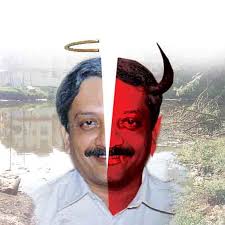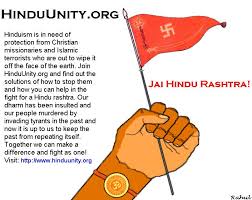
And so it has come to pass, that
the contest for the constitution of the Goa State legislative assembly, has
been cast as the choice between corruption and its alleged polar opposite of
good governance. We should bear in mind, that this ridiculously simplistic and
erroneous equation has been made possible as a result of that tainted agitation
of some months ago, the Hazare drama. This equation is ridiculous not because
the Congress-wallas are lambs bleating at the altar of the common good; after
all, who can deny that they are, almost to the last of them, wolves. This
equation is ridiculous because ‘corruption’ emanates not from a party, but from
the political and executive process in which we are all immured. Should the BJP
be elected, there is no doubt that one will be witness to similar levels of
hand-over-fist looting of the public treasury. It is hilarious infact, that the
BJP can make it sanctimonious positions when some of its candidates are not just
miners, but builders as well, when some of the individuals contesting on the BJP-alliance
tickets, were in fact indicted in the PAC reported tom-tomed by Mr. Parrikar.

To certain segments of the
population, the BJP’s claim to Good Governance rests on the unsullied
reputation (in matters of graft that is) of its ‘Chief Ministerial candidate’
Mr. Manohar Parrikar. They present a list of impressive developmental works
that he undertook for the city of Panjim, both during his stint at CM and
subsequently as MLA. In the course of his term (or was it reign?) as CM too,
they point to the simplicity of his life-style and his blemish-less personal
track record. Commonspeak has it that indeed Mr. Parrikar is above reproach,
not a single paisa entered his personal estate. The same commonspeak however suggests
that his position as CM influenced the coffers of the Party. On this front,
there is a lot of suggestion that indeed, figures were hiked, and contracts
offered to party favourites, so that the party coffers and favourites might
prosper.

The issue that emerges therefore,
and one that we should take seriously, if corruption is being made the issue,
is not only of fiscal corruption, but moral corruption as well. While the above
scenario, of using his public office to benefit the party would come under such
scrutiny, one must also examine the political ideology of the BJP, which in
itself is fairly corrupt. The reference ofcourse is to the saffron agenda of
making India a Hindu state.

Now Mr. Parrikar has been
reported to have publicly acknowledged that the sectarian actions of his previous
tenure as CM, was
the result of ‘bad advice’. He vows not to repeat this ‘mistake’again. This is a rather large herring to swallow however. Given the manner in
which we sneer at the ‘uneducated’ persons getting tickets on the Congress
train, one does not expect a focused and educated individual such as Mr.
Parrikar to be so easily swayed by ‘advice’. Perhaps Mr. Parrikar is using a
euphemism, and what he means by advice, is in fact pressure; from his
associates, both from within the BJP as well as his parent organization, the
RSS.

Let us change track for just a
moment and have a look at the track record of the BJP in one of the two states
that have been racked by communal tensions; Gujarat and Karnataka. A
recentreport on the saffronisation in Karnataka in the Tehelka points out that in
2008, “Once the BJP government was installed, it had a choice between
broad-based development of the state and consolidation of the Sangh structure.
Four years on, it’s obvious which path was chosen. In its first year itself,
the government had given evidence of its agenda. Bajrang Dal activists attacked
churches, with the administration scarcely taking stern action. The question of
whether the government would rein in extremist elements was answered in the
negative.” There is every fear of such a
systematic consolidation of the Sangh structure taking place in Goa if it comes
within the shade of the saffron umbrella. Hark back to episode, where on the
course of his tenure as CM, government-run schools were handed over to the
‘NGO’ Vidya Bharathi. Vidya Bharati it turned out was an RSS outfit. An outfit
prone to tailoring the teaching of history towards Hindutva designs, and
cultivating all manner of sectarian myths about non-Hindus. Such actions are
hardly the result of bad advice that one can ignore. It is the result of a
deliberate, calculated policy of the entire Sangh structure that the BJP is a
part of. Such a careful scheme of deliberately poisoning the social environment
of the state and country, cannot be excluded from the ambit of corruption. On
this count, the BJP cannot, under any circumstance excuse itself from the
charge of being corrupt.

There is another count on which
when examining the reputation of Mr. Parrikar, the BJP fails to match up to its
rhetoric of good governance. Mr. Parrikar’s term in office was likened to a
reign. Like absolute monarch, Mr. Parrikar is reported to have done exactly
what he felt needed to be done. Of course, given our ‘democratic’ times, he
would be more likely compared to a fast and efficient, CEO. Good governance
however, is emphatically not only about efficiency, it is also about
consultation and partnership, values that are widely felt to have been markedly
absent in the course of Mr. Parrikar’s term in office. Indeed, it is not
surprising that it is precisely the Catholic business (and feudal) classes that
feel attracted to Mr. Parrikar, and would be willing to overlook his rightist
tendencies. The larger neo-liberal environment within which we live privileges
such autonomous action that favours technical and authoritarian resolutions of
problems, forgetting the more important fact that institutions alone cannot
resolve problems. Take the naïve claims
of the India Against Corruption, an in effect right-leaning association, that
seems to think that corruption is some switch that people turn on to get jobs
done, and all we need is a Lok Ayukta to turn that switch off and resolve the
corruption problem. Social problems emerge from a plethora of social issues,
and these must be addressed, one problem at a time.

A continued interaction between
individuals and associations is fundamental to the elaboration of good
governance. No matter how loathsome the politics of Mr. Digambar Kamat, the man
has always remained approachable. One may not get a response, but one gets a
hearing; a scenario which has markedly absent from the workings of Mr.
Parrikar. This lack of a hearing bears out, given the kind of cultic image that
has been built around the man. All-knowing, all-capable (and all-powerful) why
was there a need for civil society when he knew what you needed and how it
needed to be done? The absence of a space for civil society and the dominance
of the cult figure is not a mark of good governance; it is a mark of the
fascist polity.
There is another argument that needs to be made in light of this building up of a personality cult around Mr.Parrikar. The man is no longer addressed as just a man, but per force becomes, as in this column, the target for the large claims that are being made on his behalf. Such a depersonalisation is deeply unfortunate, tragic even, given that Parrikar the man, as I would personally be able to attest, when relating with an individual in need, is a profoundly generous person.

In conclusion, the point has to
be stressed that this column is not an argument in favour of the Congress (I),
it is a plea against reducing the upcoming election to just good –governance or
corruption. To quote a friend, ‘elections are fought and won on multiple
considerations which go beyond communalism or corruption’. This is to say that an
election is not an either-or game decided between good governance and
corruption. There are plenty of other considerations that we need to consider.
To ignore these considerations, is to engage in a very dangerous game of
simplification. A game that later generations will eventually hold us
accountable for.
(A version of this post was first published in the Gomantak Times 29 Feb 2012)
 And so it has come to pass, that
the contest for the constitution of the Goa State legislative assembly, has
been cast as the choice between corruption and its alleged polar opposite of
good governance. We should bear in mind, that this ridiculously simplistic and
erroneous equation has been made possible as a result of that tainted agitation
of some months ago, the Hazare drama. This equation is ridiculous not because
the Congress-wallas are lambs bleating at the altar of the common good; after
all, who can deny that they are, almost to the last of them, wolves. This
equation is ridiculous because ‘corruption’ emanates not from a party, but from
the political and executive process in which we are all immured. Should the BJP
be elected, there is no doubt that one will be witness to similar levels of
hand-over-fist looting of the public treasury. It is hilarious infact, that the
BJP can make it sanctimonious positions when some of its candidates are not just
miners, but builders as well, when some of the individuals contesting on the BJP-alliance
tickets, were in fact indicted in the PAC reported tom-tomed by Mr. Parrikar.
And so it has come to pass, that
the contest for the constitution of the Goa State legislative assembly, has
been cast as the choice between corruption and its alleged polar opposite of
good governance. We should bear in mind, that this ridiculously simplistic and
erroneous equation has been made possible as a result of that tainted agitation
of some months ago, the Hazare drama. This equation is ridiculous not because
the Congress-wallas are lambs bleating at the altar of the common good; after
all, who can deny that they are, almost to the last of them, wolves. This
equation is ridiculous because ‘corruption’ emanates not from a party, but from
the political and executive process in which we are all immured. Should the BJP
be elected, there is no doubt that one will be witness to similar levels of
hand-over-fist looting of the public treasury. It is hilarious infact, that the
BJP can make it sanctimonious positions when some of its candidates are not just
miners, but builders as well, when some of the individuals contesting on the BJP-alliance
tickets, were in fact indicted in the PAC reported tom-tomed by Mr. Parrikar.
No comments:
Post a Comment